Health
COVID air monitor from scientists can detect virus in indoor settings within 5 minutes
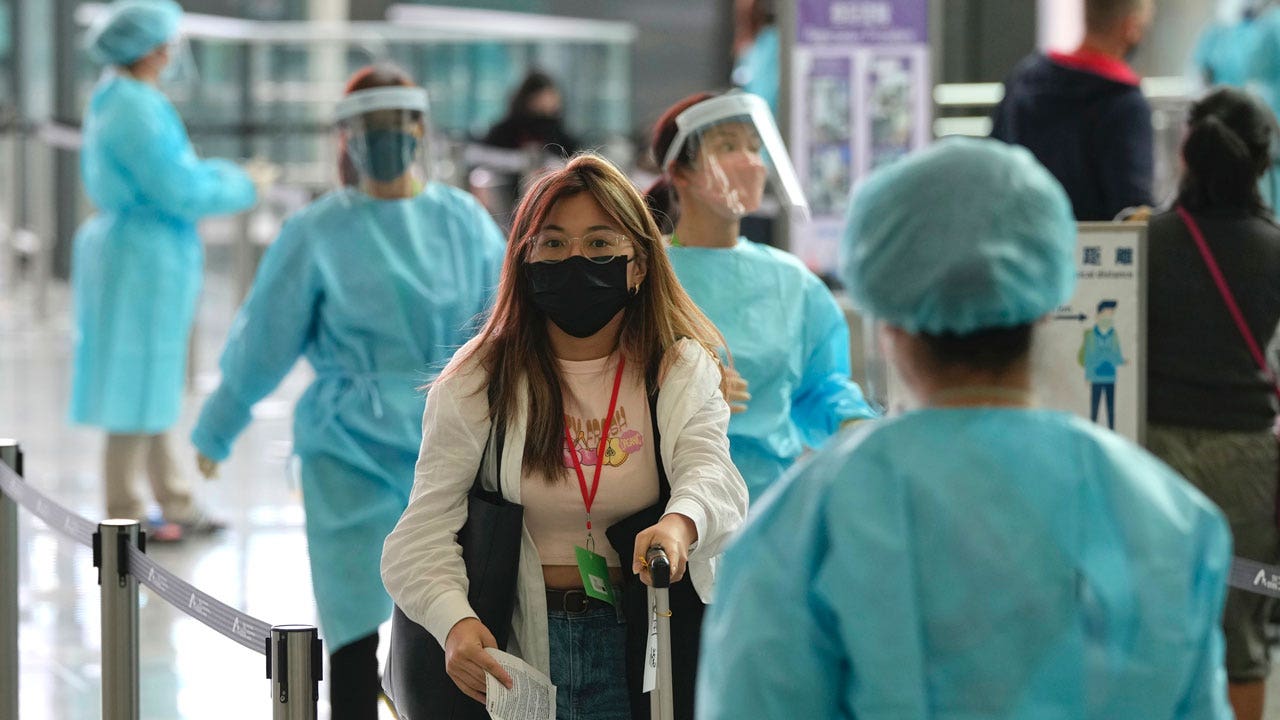
A research team said it is paving the way for an easier detection of virus variants within indoor spaces.
Scientists have developed a novel air monitor with special technology that is said to quickly detect — within five minutes — if any of the virus variants that cause COVID-19 are lurking in an indoor room.
The results were published in Nature Communications in the journal’s July 10 edition as part of a collaboration between the engineering and medicine schools at Washington University in St. Louis, Missouri.
COVID PUBLIC HEALTH EMERGENCY IS OVER: WHAT IT MEANS FOR YOU
“This device can be installed in various settings such as hospitals, airports, office spaces, theaters or any crowded indoor location where the risk of virus transmission is high and ventilation may be inadequate,” first author Dr. Joseph Puthussery and co-author Dr. Carla Yuede told Fox News Digital in emailed comments.
Puthussery is a scientist at the Center for Aerosol Science & Engineering in the McKelvey School of Engineering at Washington University, while Yuede is an associate professor in the departments of psychiatry, neurology and neuroscience at Washington University School of Medicine.
Scientists have developed a real-time air monitor with special technology that is said to quickly detect if any virus variants that cause COVID-19 are lurking in an indoor room. Above, individuals during the first year of COVID in China. (AP Photo/Chen Si)
Airborne aerosol detectors have difficulty detecting COVID-19 virus particles because the indoor air is so diluted that it’s “like finding a needle in a haystack,” said co-author Rajan Chakrabarty, PhD, researcher and associate engineering professor at Washington University.
But now, the scientists said they’ve created a real-time monitor that can detect any of the SARS-CoV-2 virus variants in a room within about five minutes.
Biosensor detects COVID-19 virus particles
The idea for the project started after the team wondered if a micro-immunoelectrode (MIE) biosensor that was previously developed for detecting a biomarker for Alzheimer’s disease could be converted into a detector for SARS-CoV-2.
WHO DOWNGRADES CORONAVIRUS PANDEMIC, NO LONGER A GLOBAL EMERGENCY
“The MIE biosensor is a microelectrode containing an immobilized antibody (or nanobody) on the surface and uses an electrochemical method of detection,” Puthussery and Yuede told Fox News Digital in an email.
The researchers first developed the custom-built air sampler through simulations.
“The combination of the small size of the electrode and [the] specificity of the antibody/antigen interaction makes this biosensor very sensitive and specific to the target of interest,” they also said.
The team exchanged the antibody in the biosensor that recognizes a marker for Alzheimer’s disease to a “nanobody” — which recognizes the spike protein from the SARS-CoV-2 virus.
The group then integrated the biosensor into an air monitor that samples the indoor air at high speeds based on “wet cyclone technology.”
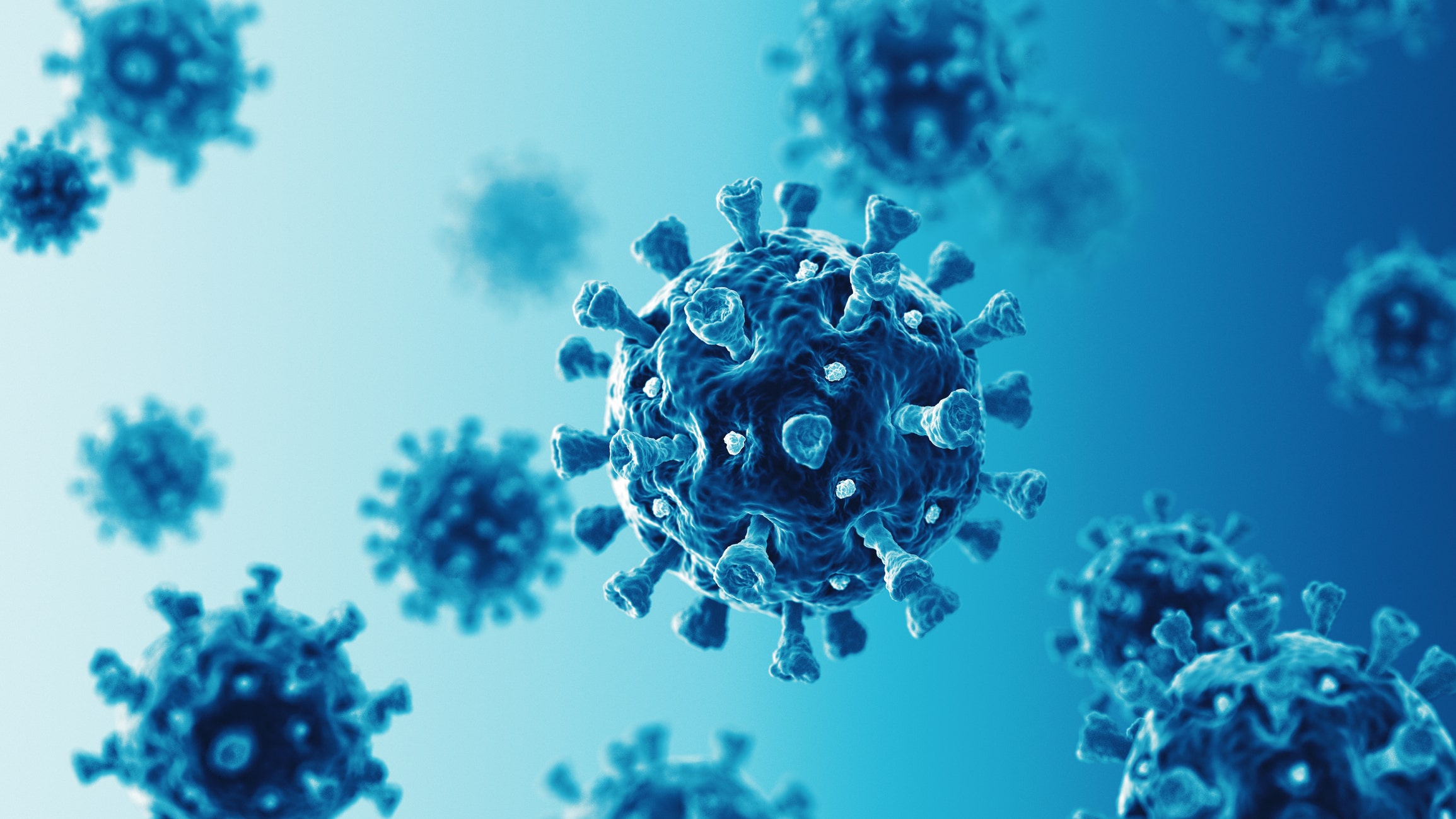
An air monitor in development — measuring only one foot wide by 10 inches tall — lights up when a virus such as COVID-19 (shown here) is detected. (iStock)
The researchers first developed the custom-built air sampler through simulations to discover the optimal size and the sampling flow rate necessary for capturing the “nano-sized” virus particles, Puthussery and Yuede told Fox News Digital.
Once inside the sampler, centrifugal force pushes the air outward to mix with fluids that line its walls.
NEW REPORT SUGGESTS ‘PANIC BUYING’ OF MEDICATIONS BY PATIENTS AND PROVIDERS CAUSED DRUG SHORTAGES
These fluids contain the nanobody that detects COVID-19 virus particles — trapping the virus aerosols.
‘Virus collection efficiency’
Most commercial bioaerosol samplers have low flow rates — but the team’s air monitor has one of the highest flow rates, it said.
This means it can sample a larger volume of air over five minutes, the press release noted.
Its compact size, measuring only one foot wide by 10 inches tall, lights up when a virus is detected, alerting people to increased airflow or the circulation in the room, the press release added.
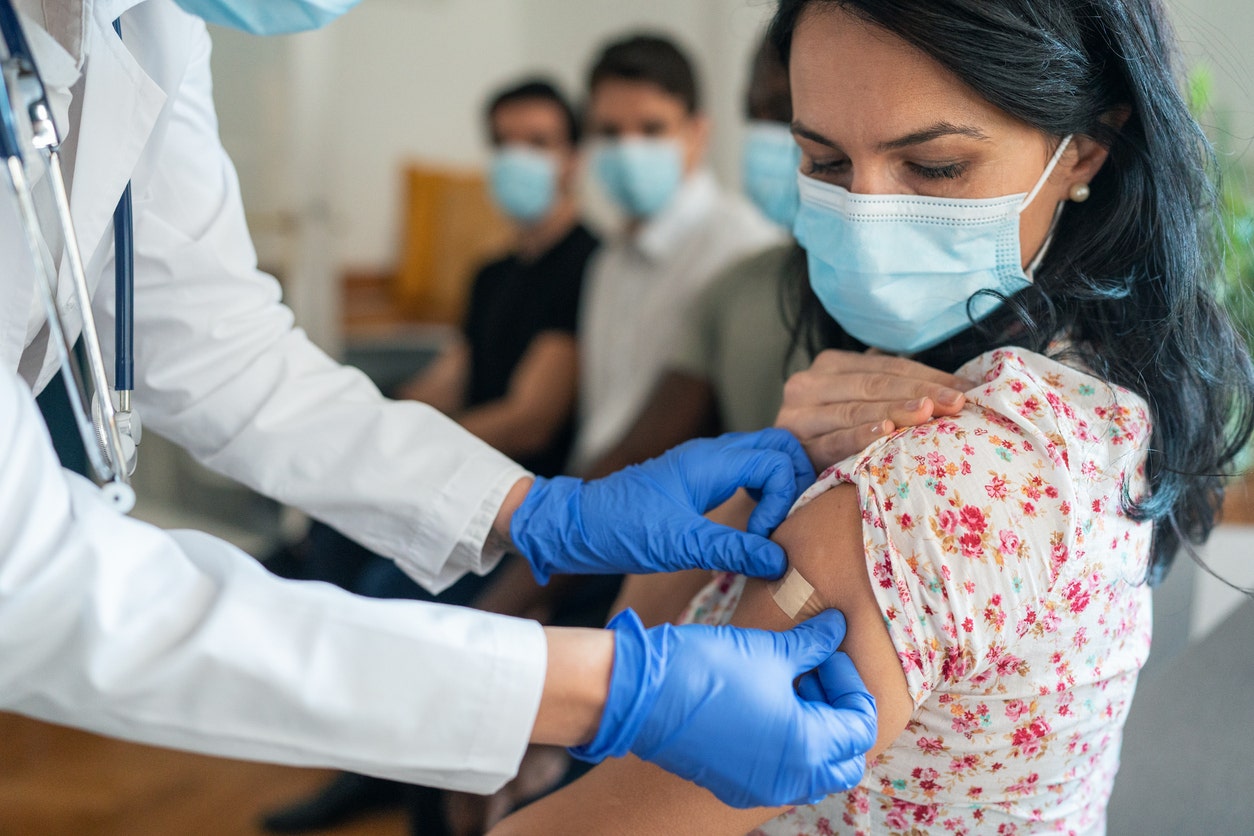
A novel air monitor created by researchers at Washington University in St. Louis, Missouri, detected the virus particles in the seven samples in the rooms contaminated with COVID-19 virus, the researchers said. Above, a woman receives a vaccination against the coronavirus. (iStock)
“We conducted experimental comparisons of the virus collection efficiency between the wet cyclone and two commercially available low-flow research-grade bioaerosol samplers,” the researchers told Fox News Digital.
“These experiments involved aerosolizing inactivated SARS-CoV-2 at various concentrations within a well-mixed sealed chamber.”
The monitor is at the proof-of-concept stage as of now. The research team is working to commercialize it.
They found the wet cyclone either outperformed or had comparable performance to the other samplers.
They validated their findings by collecting air samples from the self-isolating bedrooms of two individuals infected with COVID-19 — as well as a control room that was not contaminated with COVID-19 air.
The air monitor detected the virus particles in the seven samples in the rooms contaminated with COVID-19 virus.
MANY YOUNG KIDS ARE NOT GETTING ‘LIFE-SAVING’ VACCINES, STUDY FINDS: ‘CONCERNING TREND’
And it did not detect any virus particles in samples from the virus-free control room.
‘Real-time data’
The monitor will help people in the future “easily recognize and avoid areas that have reported a high presence of the virus,” the researchers told Fox News Digital.
The team hopes to expand the air monitor capabilities to measure other common viruses that infect people as well, such as influenza, RSV and rhinovirus.
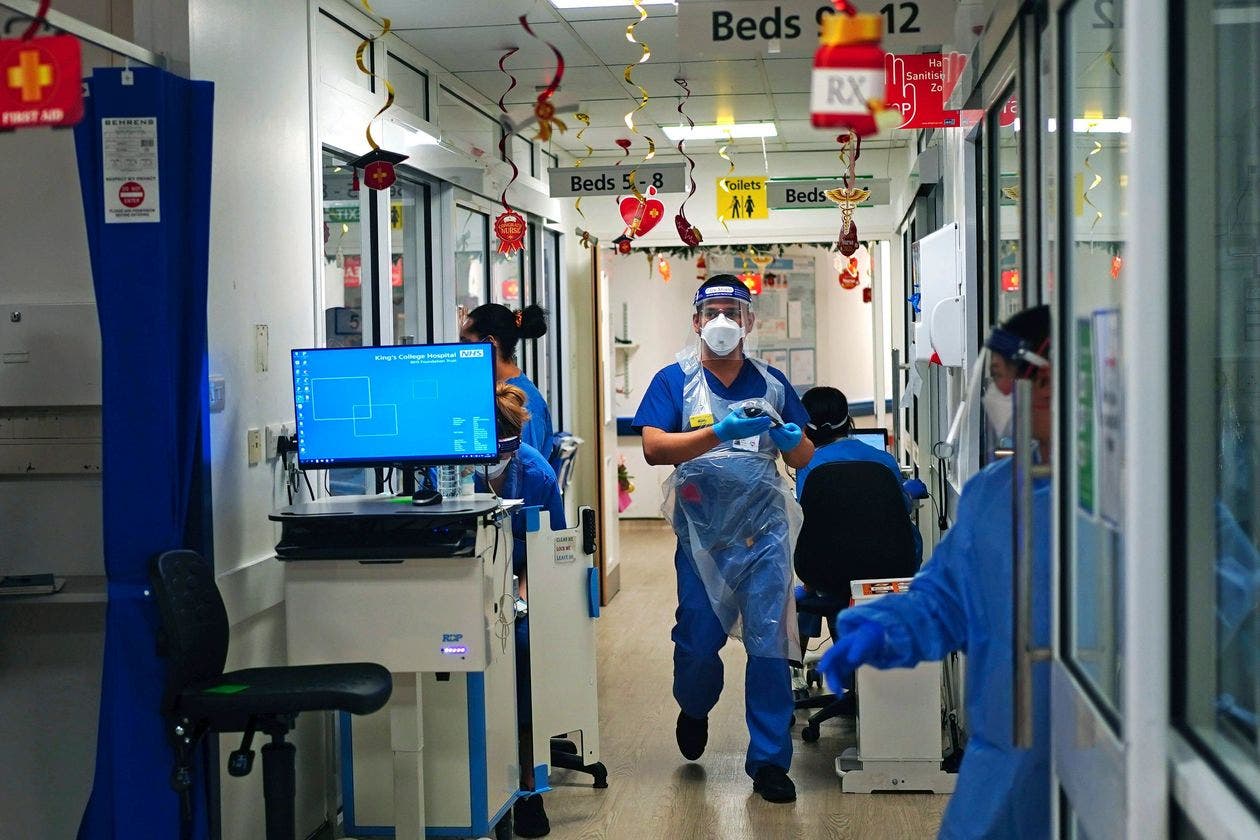
The researchers validated their findings by collecting air samples from the self-isolating bedrooms of two individuals infected with COVID-19 — as well as a control room that was not contaminated with COVID-19 air. Above, hospital teams care for patients with COVID-19 during the pandemic. (Associated Press)
This will help people know when to wear masks when entering areas that consistently show the presence of a virus.
The device provides “peace of mind,” the researchers said.
“If you are someone who feels stressed attending a crowded public indoor event, you can access real-time data and be assured of your safety,” the researchers said.
Limitations of the device
One limitation of the monitor is “the high noise level (75–80 dB) during device operation, which can have an adverse effect on the health and comfort of the occupants of a building,” the researchers told Fox News Digital.
CLICK HERE TO SIGN UP FOR OUR HEALTH NEWSLETTER
“Current efforts are underway to find economically feasible solutions to reduce the noise levels to <65 dB, such as using a low-noise motor and soundproofing the device exterior using an acoustic liner.”
The monitor is at the proof-of-concept stage as of now.
The research team is working to commercialize the air monitor in the near future.

Health
Jennifer Hudson Lost 80-Lbs Without Depriving Herself—Learn Her Secrets

Sign Up
Create a free account to access exclusive content, play games, solve puzzles, test your pop-culture knowledge and receive special offers.
Already have an account? Login
Use left and right arrow keys to navigate between menu items.
Use escape to exit the menu.
Health
Kennedy’s Plan for the Drug Crisis: A Network of ‘Healing Farms’

Though Mr. Kennedy’s embrace of recovery farms may be novel, the concept stretches back almost a century. In 1935, the government opened the United States Narcotic Farm in Lexington, Ky., to research and treat addiction. Over the years, residents included Chet Baker and William S. Burroughs (who portrayed the institution in his novel, “Junkie: Confessions of an Unredeemed Drug Addict”). The program had high relapse rates and was tainted by drug experiments on human subjects. By 1975, as local treatment centers began to proliferate around the country, the program closed.
In America, therapeutic communities for addiction treatment became popular in the 1960s and ’70s. Some, like Synanon, became notorious for cultlike, abusive environments. There are now perhaps 3,000 worldwide, researchers estimate, including one that Mr. Kennedy has also praised — San Patrignano, an Italian program whose centerpiece is a highly regarded bakery, staffed by residents.
“If we do go down the road of large government-funded therapeutic communities, I’d want to see some oversight to ensure they live up to modern standards,” said Dr. Sabet, who is now president of the Foundation for Drug Policy Solutions. “We should get rid of the false dichotomy, too, between these approaches and medications, since we know they can work together for some people.”
Should Mr. Kennedy be confirmed, his authority to establish healing farms would be uncertain. Building federal treatment farms in “depressed rural areas,” as he said in his documentary, presumably on public land, would hit political and legal roadblocks. Fully legalizing and taxing cannabis to pay for the farms would require congressional action.
In the concluding moments of the documentary, Mr. Kennedy invoked Carl Jung, the Swiss psychiatrist whose views on spirituality influenced Alcoholics Anonymous. Dr. Jung, he said, felt that “people who believed in God got better faster and that their recovery was more durable and enduring than people who didn’t.”
Health
Children exposed to higher fluoride levels found to have lower IQs, study reveals

The debate about the benefits and risks of fluoride is ongoing, as RFK Jr. — incoming President Trump’s pick for HHS secretary — pushes to remove it from the U.S. water supply.
“Fluoride is an industrial waste associated with arthritis, bone fractures, bone cancer, IQ loss, neurodevelopmental disorders and thyroid disease,” RFK wrote in a post on X in November.
A new study published in JAMA Pediatrics on Jan. 6 found another correlation between fluoride exposure and children’s IQs.
RFK JR. CALLS FOR REMOVAL OF FLUORIDE FROM DRINKING WATER, SPARKING DEBATE
Study co-author Kyla Taylor, PhD, who is based in North Carolina, noted that fluoridated water has been used “for decades” to reduce dental cavities and improve oral health.
Fluoride exposure has been linked to a variety of negative health effects, yet benefits oral health. (iStock)
“However, there is concern that pregnant women and children are getting fluoride from many sources, including drinking water, water-added foods and beverages, teas, toothpaste, floss and mouthwash, and that their total fluoride exposure is too high and may affect fetal, infant and child neurodevelopment,” she told Fox News Digital.
The new research, led by scientists at the National Institute of Environmental Health Sciences (NIEHS), analyzed 74 epidemiological studies on children’s IQ and fluoride exposure.
FEDERAL JUDGE ORDERS EPA FURTHER REGULATE FLUORIDE IN DRINKING WATER DUE TO CONCERNS OVER LOWERED IQ IN KIDS
The studies measured fluoride in drinking water and urine across 10 countries, including Canada, China, Denmark, India, Iran, Mexico, Pakistan, New Zealand, Spain and Taiwan. (None were conducted in the U.S.)
The meta-analysis found a “statistically significant association” between higher fluoride exposure and lower children’s IQ scores, according to Taylor.
“[It showed] that the more fluoride a child is exposed to, the more likely that child’s IQ will be lower than if they were not exposed,” she said.
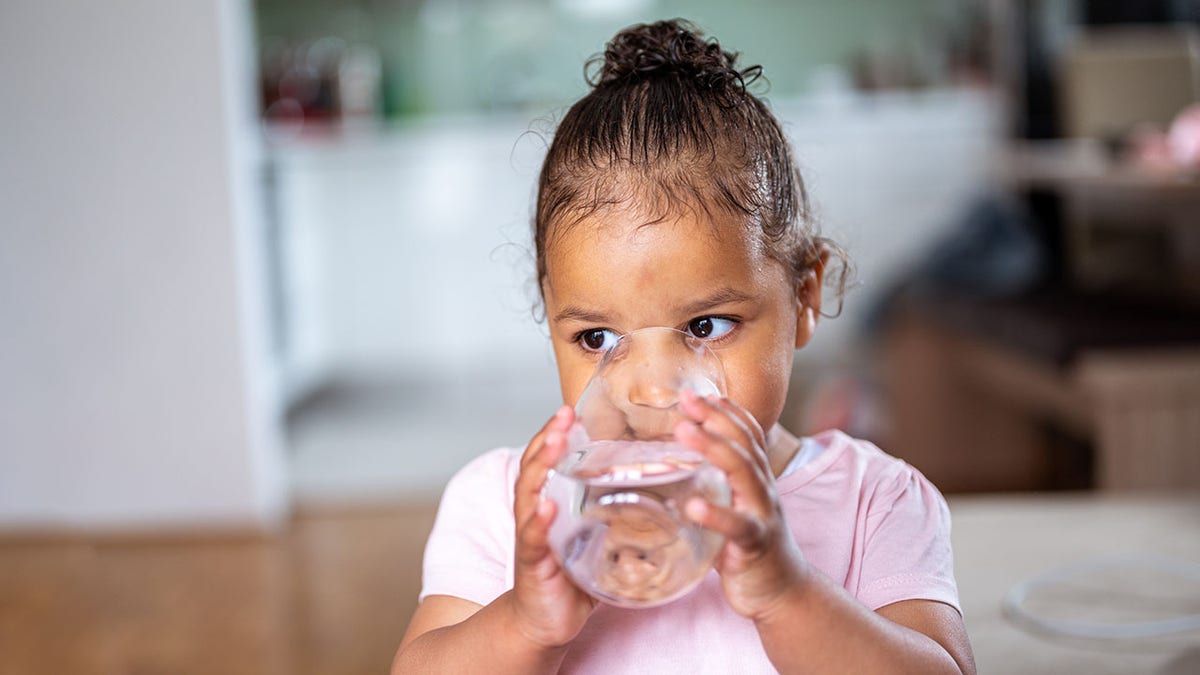
Scientists found a “statistically significant association” between higher fluoride exposure and lower children’s IQ scores. (iStock)
These results were consistent with six previous meta-analyses, all of which reported the same “statistically significant inverse associations” between fluoride exposure and children’s IQs, Taylor emphasized.
The research found that for every 1mg/L increase in urinary fluoride, there was a 1.63-point decrease in IQ.
‘Safe’ exposure levels
The World Health Organization (WHO) has established 1.5mg/L as the “upper safe limit” of fluoride in drinking water.
“There is concern that pregnant women and children are getting fluoride from many sources.”
Meanwhile, the U.S. Public Health Service recommends a fluoride concentration of 0.7 mg/L in drinking water.
“There was not enough data to determine if 0.7 mg/L of fluoride exposure in drinking water affected children’s IQs,” Taylor noted.
FDA BANS RED FOOD DYE DUE TO POTENTIAL CANCER RISK
Higher levels of the chemical can be found in wells and community water serving nearly three million people in the U.S., the researcher noted.
She encouraged pregnant women and parents of small children to be mindful of their total fluoride intake.

Nearly three million people have access to wells and community water with fluoride levels above the levels suggested by the World Health Organization. (iStock)
“If their water is fluoridated, they may wish to replace tap water with low-fluoride bottled water, like purified water, and limit exposure from other sources, such as dental products or black tea,” she said.
“Parents can use low-fluoride bottled water to mix with powdered infant formula and limit use of fluoridated toothpaste by young children.”
For more Health articles, visit www.foxnews.com/health.
While the research did not intend to address broader public health implications of water fluoridation in the U.S., Taylor suggested that the findings could help inform future research into the impact of fluoride on children’s health.
Dental health expert shares cautions
In response to this study and other previous research, Dr. Ellie Phillips, DDS, an oral health educator based in Austin, Texas, told Fox News Digital that she does not support water fluoridation.
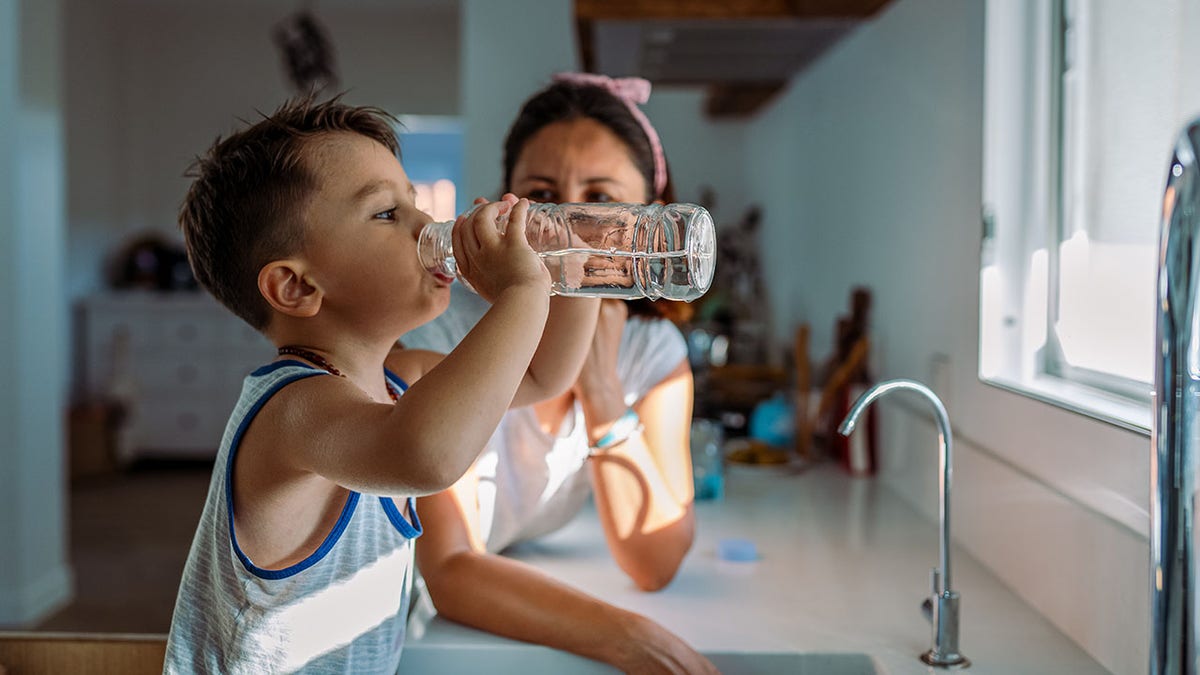
The study researcher encouraged parents of small children to be mindful of their total fluoride intake. (iStock)
“I join those who vehemently oppose public water fluoridation, and I question why our water supplies are still fluoridated in the 21st century,” she wrote in an email.
“There are non-fluoridated cities and countries where the public enjoy high levels of oral health, which in some cases appear better than those that are fluoridated.”
CLICK HERE TO SIGN UP FOR OUR HEALTH NEWSLETTER
Phillips called the fluoride debate “confusing” even among dentists, as the American Dental Association (ADA) advocates for fluoride use for cavity prevention through water fluoridation, toothpaste and mouthwash — “sometimes in high concentrations.”

Fluoride is used in water, toothpaste and mouthwash to help prevent cavities. (iStock)
“[But] biologic (holistic) dentists generally encourage their patients to fear fluoride and avoid its use entirely, even if their teeth are ravaged by tooth decay,” she said.
“Topical fluoride is beneficial, while systemic consumption poses risks.”
Phillips encouraged the public to consider varying fluoride compounds, the effect of different concentrations and the “extreme difference” between applying fluoride topically and ingesting it.
“Topical fluoride is beneficial, while systemic consumption poses risks,” she cautioned.
“Individuals must take charge of their own oral health using natural and informed strategies.”
The study received funding from the National Institute of Environmental Health Sciences (NIEHS), the National Institutes of Health (NIH) and the Intramural Research Program.
-
/cdn.vox-cdn.com/uploads/chorus_asset/file/25822586/STK169_ZUCKERBERG_MAGA_STKS491_CVIRGINIA_A.jpg)
/cdn.vox-cdn.com/uploads/chorus_asset/file/25822586/STK169_ZUCKERBERG_MAGA_STKS491_CVIRGINIA_A.jpg) Technology1 week ago
Technology1 week agoMeta is highlighting a splintering global approach to online speech
-

 Science1 week ago
Science1 week agoMetro will offer free rides in L.A. through Sunday due to fires
-
/cdn.vox-cdn.com/uploads/chorus_asset/file/23935558/acastro_STK103__01.jpg)
/cdn.vox-cdn.com/uploads/chorus_asset/file/23935558/acastro_STK103__01.jpg) Technology7 days ago
Technology7 days agoAmazon Prime will shut down its clothing try-on program
-

 News1 week ago
News1 week agoMapping the Damage From the Palisades Fire
-
/cdn.vox-cdn.com/uploads/chorus_asset/file/25826211/lorealcellbioprint.jpg)
/cdn.vox-cdn.com/uploads/chorus_asset/file/25826211/lorealcellbioprint.jpg) Technology7 days ago
Technology7 days agoL’Oréal’s new skincare gadget told me I should try retinol
-
/cdn.vox-cdn.com/uploads/chorus_asset/file/25832751/2192581677.jpg)
/cdn.vox-cdn.com/uploads/chorus_asset/file/25832751/2192581677.jpg) Technology3 days ago
Technology3 days agoSuper Bowl LIX will stream for free on Tubi
-

 Business5 days ago
Business5 days agoWhy TikTok Users Are Downloading ‘Red Note,’ the Chinese App
-
/cdn.vox-cdn.com/uploads/chorus_asset/file/25835602/Switch_DonkeyKongCountryReturnsHD_scrn_19.png)
/cdn.vox-cdn.com/uploads/chorus_asset/file/25835602/Switch_DonkeyKongCountryReturnsHD_scrn_19.png) Technology1 day ago
Technology1 day agoNintendo omits original Donkey Kong Country Returns team from the remaster’s credits















